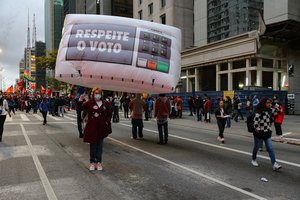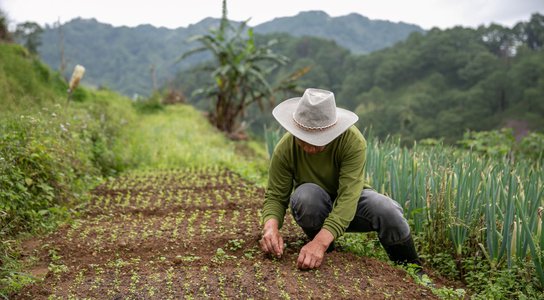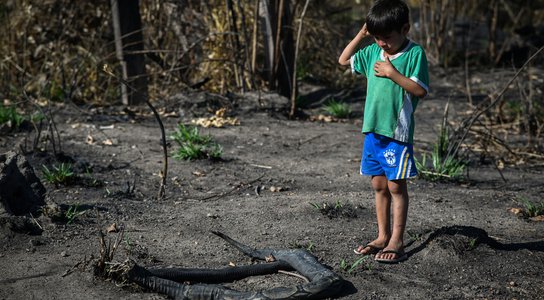On 2 October 2022, the people of Brazil will take to the polls in one of the most important elections in recent years, and our investigation recently exposed how Facebook is not equipped to stop the spread of disinformation that could undermine its integrity.
The social media giant failed to detect disinformation ads that included wrong information – such as false methods of voting and the wrong election date – as well as information aimed to make Brazilians question the election result.
Our findings are incredibly worrisome ahead of a tense election that will have global ramifications. The significance of October’s election will not be contained within Brazil’s borders, but will have an impact which will be felt the world over – because as well as domestic policy, the future of our climate is up for election this year.

People stage a demonstration against Brazilian President Jair Bolsonaro and in defense of democracy in Sao Paulo, Brazil. Paulo Lopes/Anadolu Agency via Getty Images
The dangers of disinformation
While it is not for us to try and sway how the Brazilian electorate vote, it is important to ensure that the election is decided on the basis of accurate information – rather than lies and distortions.
Large social media platforms have played a major role in fostering a toxic information ecosystem. Disinformation about climate change, hate surrounding climate activists, and climate denial are being fed by social media filter bubbles.
Disinformation featured heavily in Brazil’s 2018 election, and this year’s election is already marred by reports of widespread disinformation, spread from the very top. With the polls favouring his main rival, Bolsonaro is already seeding doubt about the legitimacy of the election result, raising fears that he will borrow from the Trump playbook and attempt a January 6 “Stop the Steal”-style coup attempt should the election not go his way.
As he launched his re-election bid in July this year, Bolsonaro declared “The army is on our side” – an ominous declaration in a country which was ruled by a military dictatorship from 1964 until as recently as 1985. In this context, social media companies have an immense responsibility to ensure that disinformation spreading on their platforms is not undermining trust in the democratic process, and is not threatening the peaceful transfer of power.
The environmental stakes are high
Brazil’s recent poor record on climate commitments has been disastrous for the Amazon rainforest, the vast majority of which lies within Brazil’s national borders, and other climate-critical ecosystems in the country. While the government has pledged to protect the Amazon, these commitments have been described as merely “lip service”.
Meanwhile, levels of forest destruction in the Amazon have broken record after record, pushing it further towards a tipping point at which it may stop functioning as a rainforest ecosystem altogether. Legal protections have been slashed, government agencies responsible for safeguarding the rainforest have been undermined, and forest crimes have been carried out with widespread impunity.
Indigenous people, who have historically done the most to preserve the largest areas of the Amazon, have also come under sustained attack. Recent legal changes have made it increasingly difficult for Indigenous people to assert their territorial rights over their traditional lands, paving the way for these previously protected areas to be opened up to mining, logging, and other destructive industries.
At the same time, physical attacks against Indigenous people, and other land and environmental defenders, have continued apace. Brazil consistently ranks as one of the most dangerous countries to be an environmental defender. This level of impunity culminated earlier this year in the murders of Indigenous expert Bruno Pereira and journalist Dom Phillips.
October’s election will determine whether there is a mandate to continue these alarming trends, or whether the opposition will have a chance to fulfil its promises to reverse them.
Not a priority?
Our own investigations have exposed that Facebook’s moderation systems have consistently failed to detect hateful, violent social media ads targeting Myanmar, Ethiopia, and Kenya. Now, we have found that these systems appear incapable of picking up ads containing disinformation aimed at undermining the integrity of the Brazilian presidential election.
The fact that Facebook has failed four times in a row to pick up highly problematic content that blatantly breaches its own rules shows that its ability to enforce its own policies are woefully inadequate, presumably either because it’s not inclined to do so, or it hasn’t dedicated the necessary resources to protect its users.
That’s why it’s so important to show to social media companies that outsiders are watching and will hold them to account.
At such a critical moment for both Brazilian democracy and for the climate, technology platforms must take urgent action to tackle disinformation. Specifically, they must ensure that:
- Brazilian election-related platform efforts are properly resourced
- Their policies on election-related disinformation are being enforced
- Policies that are in place in the United States are rolled out globally for all elections


